#how to find a profitable product to sell on amazon
Explore tagged Tumblr posts
Text
20 Best Products To Sell On Amazon In 2023 (According To Data)
20 Best Products To Sell On Amazon In 2023 (According To Data)
Best products to sell on Amazon: the data Every item on this list contains the following data: Number of Listings – The number of products that appear when you enter the item as a keyword into Amazon’s search bar. Search Volume – The number of searches the product receives on Amazon on a monthly basis. Average Revenue – The average annual revenue each listing for a particular product…

View On WordPress
#amazon fba#amazon fba for beginners#amazon fba product research#amazon fba step by step#amazon product research#best products to sell on amazon#how to find a profitable product to sell on amazon#how to find products to sell on amazon#how to sell on amazon#product research amazon#product research amazon fba#sell on amazon#selling on amazon#top 10 products to sell on amazon#top products to sell on amazon
0 notes
Note
I saw your post about ingram, and out of curiosity, is there some advantage to going through the whole self-publishing thing with retailers when you're just starting out? like I mean the way that fandom zines work is that they don't even bother going through ingram or amazon or whatever. they just set up a social media site (usually twitter) to gain followers, open preorders (usually 1-2 months in length) to generate the costs of printing upfront, and then sell anywhere from a few dozen to several hundred copies of their books (usually artbooks, but anthologies exist too). I've seen some zines generate over a thousand orders. they're kind of like pop-up shops, except for books. maybe the sales numbers aren't so impressive to a real author, but the profit generated is typically waaaay more than the $75+ apparently needed for Ingram Spark, so I still feel like new authors could benefit from this method too, especially if they just need some start-up cash to eventually move to ingram if they want to for subsequent runs of their book. I think authors would also have to set aside some of the pre-order money to buy an ISBN number to have printed on their book, and I'm not really sure what other differences there are, but I just wanted to ask about it in case there's some huge disadvantage I'm missing!
So, popup zines work well for some people, and I know some authors who kickstart their work successfully. But for a lot, it's just not feasible as a long-term stratedy. Or even as a means to get off the ground.
Fanzines succeed primarily because an existing fanbase is willing and ready to throw money at something they love. They’ve got a favorite writer or artist they want to support. Supporting all the others is just a happy by-product. They also take a HUGE amount of short-term but intense planning that just doesn’t always jive with how some of us work.
I, for one, would never offer to organize a fanzine. I’ll take part in them as a creator, but I’d rather throw myself off a cliff than subject myself to wrangling that many people and dealing with the legal logistics.
When it comes to authors doing anthologies, it'svery much the same. The success of the funding often hinges on having other big-name authors involved whose existing fans will prop up the project. Or having a huge marketing budget.
Most self-pub authors have zero marketing budget. I’m one of them, and I’m under no illusions that my work would not be as popular and self-sustaining as it is if I didn’t have a large Tumblr blog.
When I thank Tumblr in my forewards, I am utterly sincere. Tumblr brought fandom levels of enthusiasm to an unknown work and broke the Amazon algorithm so hard, that Amazon thought I was bot sniping my way to multiple #1 spots and froze my sales rankings.
That’s not the norm. And while I could probably kickstart my own work as an indie creator, that’s because I’ve put literal decades into building up a readership. I’ve been doing this since I was 16 and realized people thought I was funny. I didn’t know what to do with it or if I’d ever actually write anything, but it meant the groundwork was already there (thank you, past-me). I basically fell upward into my success by virtue of never being able to shut the fuck up and wanting to make people laugh. Clown instincts too strong.
New or first-time authors trying to sell their work without that will find it infinitely harder.
All of that aside, even if an unknown author somehow gets lucky and manages to fund their work, there’s still the question of shipping and distribution logistics. Are you shipping everything yourself? Better hope you’re able-bodied and have the time for it. (for reference, it took me months to ship out 300 patreon hardbacks because of my disabilites. It damaged my back and hands. I couldn’t type for several weeks after I was done.)
Are you going to sell primarily at conventions? Better hope you’re able-bodied, have the time and don’t have cripling anxiety about being in large groups...
Also, will selling a dozen to a few thousand copies in one burst be sustainable in the long run as a career? Not for me. Doing things via Ingram and Amazon means I earn a steady trickle of sales for the rest of my life provided the platforms remain and so long as I keep working and can generate interest in the series, not just when I have funds to pay for physical copies to sell. The one-time (in theory) cost of $75 to distribute through Ingram gets paid off pretty quick that way. And it doesn't require the same logistics as doing the popup/crowdfund.
Ultimately, it comes down to what you are capable of but also the type of work you’re doing. If you’ve got an extended network of fellow creatives who will back you or you’ve got a large following elsewhere, doing it like a popup might work for you.
If you’re an exhausted burnout who can’t fathom the short but intense amount of organization that sort of thing requires, not to mention doing it over and over and over... Ehhhhh. No thank you.
583 notes
·
View notes
Text
I hate modern shopping
I hate how we are practically forced to buy clothes online now. I want to hold it in my hands. I hate how cheap on low quality clothes are today. I hate that production rates and profit come before people's wellbeing.
I hate Shein for brainwashing us into thinking a shirt should cost less than $5 when it's been clear for a while that their products are usually chock full of lead and new allegations say Shein is using actual slave labor
I hate Temu for bringing expected prices even lower and selling negative ion (which might protect you from 5G but certainly doesn't help on the radioactive front) items. For selling cheap garbage and trying to tell us they're a company.
I hate Shein and Temu for basically forcing underage influencers to take sponsorships so they can get out of bad financial situation.
I hate Amazon, but not their workers
I hate Etsy, but not their shop owners
I hate modern shopping. I'm tired of the labor violations. I'm tired of the bs and the hoops you have to jump through to find a company that doesn't use child labor.
I hate that pay is bad enough that people are forced to work for people like Shein, Temu, Amazon, etc.
I hate that we aren't paid enough to buy even mediocre quality products. I hate that about ~19 people for every 10,000 in America is homeless and 40% of homeless people have jobs. I hate that we are considered entitled when all we want is an apartment and to maybe be treated like human beings at work.
Anyway here's my personal good but expensive recommendation:
Sheep Inc clothing will last decades at least. They have a repair service which you can use for life.
This isn't a paid ad I just like their business model
Btw, don't even get me started on Nestle
#sheep inc#shein#temu#negative ion#negative ion is bunk#negative ion is radioactive#us politics#politics#clothing#fashion#historic fashion#shopping#online shopping#ebay#etsy#autumn#fall vibes#autumn aesthetic#fall aesthetic#anti capitalist#anti capitalism#capitalism#capitalist hell#capitalist dystopia
219 notes
·
View notes
Note
I love your insights and agree that Jensen’s deal with Amazon seems to fit more like a actor’s holding deal. If I understand how those work, it’s where the studio pays the actor a salary for a year to hold them to try and find a role for him/her in a tv show or movie. Is that correct?
You’ve said Amazon doesn’t pay actors very well, so what is your guess to Jensen’s salary that Amazon is paying him? (Is that how he was able to afford a $10million mansion in Connecticut?)
Do those work like typical salaries (weekly/monthly) or because it was also tied to his production company, was that annual salary paid to him in an upfront sum with hopes the ackles would use the money to develop a project?
given the strike, the ackles cannot develop anything, do they have to refund any money back to amazon?
Thank you and yes, in typical holding deals the actor will receive a salary for at least one year while the studio finds a suitable project for them. Similarly, Jensen would get paid X amount of dollars for the term no matter what. He would get a check every month that comes out of the millions in his deal, this will go to pay for overhead of running Chaos Machine, including employee salaries., office space, etc. So any advanced money the Ackles received is their's to keep even if there are no project(s) for Amazon's original programming.
With that said, I highly doubt that the CMP received the typical starter $10 million for production overheads as the deal was to hire Jensen for his acting (and his fandom). Jensen may have received $1 million in retainer fee instead.
As for the Ackles' ~ investment in Connecticut, he's going to sell that house in a year or two to an Irrevocable Life Insurance Trust, then use the “sale” and the equity in the CT house to buy another house, just like he did with the Colorado house that was brought when he sold the Austin lake house (at half the market value) to the same trust. For example, if the Ackles put down at least 20% for the lake house, when the property’s value goes up by 20% (and it will), the Ackles have now made a 100% ROI and that’s before considering rents and tax write offs. Then when the houses like the lake house is sold for real in 10, 15, or 20 years, it will be sold at it's actual market price. It's a classic use of these types of trusts to make money by reaping the actual profit from the real sale and on top of the previous profit when the house was first sold into the trust.
Jensen can easily never work again in his life just by living off his net worth, which I’ve speculated to be 20-25 million dollars and if he invest conservatively his net worth will double in ten years. While he's ~investing in real estates, I suspect his main source of passive income comes from investing in target-date funds, they’re a mix of stocks, bonds, and alternative assets and probably in a collection of mutual funds. If Jensen keeps to the common rule of withdrawal limit of 4%, he’ll have at least $1 million fuck-you money every year, more than enough to cover property tax and he and his family will be comfortably wealthy for the rest of their lives without working. But men need to work, hence why he pitched to WB the ideal of continuing SPN after Jared leaves.
@supernaturalconvert techically the trusts own the houses, and the people currently living at the lake house are paying rent to the "beneficiaries", which are the Ackles.
17 notes
·
View notes
Text
How to Publish a Book, pt 1
I told @tryxyhijinks I was gonna turn this into a shitpost, so here we go: how to publish an ebook in ten easy steps.
Write the book. This is, believe it or not, the fun part.
Edit the book. Slightly less easy, but you have to do this, no matter what anyone else has told you about "minimum viable product" or what have you. You can force your friends to read it, you can have a program read it aloud to you, you can read it backwards, you can hire someone to line edit your work, you can do some or most of the above, just get it edited. (Additional point: when hiring a professional, if you're happy with the plot, ask for line or copyediting; if you're not sure about plot points, ask for developmental editing; if you just need guidance, you may want to start with an editorial letter.)
Get a cover. You can make one yourself or pay someone to do it. You're going to want it to be about 1600x2500 pixels and 72 dpi. It's good to have a really nice cover, because covers sell books.
Typeset the book. I use Atticus to create an epub file. If you are also doing a print version or you are a control freak, I recommend it. Vellum and Reedsy are about the same, I think. If you have a lot of illustrations--big ones, I mean, not just an author photo--you should beg, borrow, or steal a copy of InDesign. You can use Calibre to compress your output epub file if you want to make sure you earn every available penny. However, my book is 6mb and it is about 8 cents to download. Also, if you're trying to do this on the cheap, you really can just do it in Word. The layout won't be as fancy, but you can do it. (Layout granularity, from least to most granular, is probably Word->Atticus->InDesign.)
If you want to publish under a press name that is not your name, you will need to start a business. Laws around taxes and registration may vary depending on where you are, but in general, you will want to register your name with your state or county registrar (for me, this cost $30 and I had to get a piece of paper notarized). Then you can get a business checking account (for me this part was free--I went through the bank I already have accounts with). In the US, sole proprietorships like this are taxed as pass-through entities, so you will pay personal income taxes on whatever money you make, but you don't have to pay corporate income taxes. If you are publishing books that could possibly get you sued (e.g., The Big Book of Welding While Juggling or Now You're Cooking with Napalm) you may want to form an LLC. Talk to a lawyer.
Open a KDP account. If you hate the Zon and want to only publish somewhere else (Apple Books, Kobo, Barnes and Noble, Smashwords, whatever), that's fine--the process is about the same. If you think you previously had a KDP account and then didn't use it, search your emails etc. to try to find out, because if they figure that out, they'll close both accounts and then you won't get paid.
Add your new title to the catalog (you will need to add metadata, like your name, series name if there is one, and a description of the book) and set the prices. Unless your book is super big, you'll probably earn more if you select the 70% option. For some reason, I changed a few of the prices. If you're planning to publish on several platforms, I don't recommend this--just set your price in one place and then let it convert those. Otherwise, you'll have to reinput everything over and over, because it's in the terms of service that you need to price things the same on Kobo as you do on Amazon (and so on).
Set the day of publication and tell people about it. Like your mom. Your weird aunt who's always so supportive. Your friend who has been listening to you bitch about how hard writing is for the past six months.
???
Profit.
Q: Hey, I want my book in several online stores, not just Amazon.
A: You have a few options. Draft2Digital/Smashwords and IngramSpark both distribute digitally to various places so you only have to set things up once. But they take a cut of the profit for this service. You can also set up independent accounts with each store and upload your stuff.
Q: What happens in step 9?
A: You know. Meet other indie writers and try to gain their trust. Read a lot. Work on the sequel. Get some sleep, because deadlines are exhausting, even self-imposed ones. Learn about advertising. That sort of thing.
Next time, I'll do the paper side of things.
27 notes
·
View notes
Text
This is a very revealing moment for how the modern AI community is thinking:
The question now is whether passing the Turing test even matters anymore. “It’s totally unclear whether this is a meaningful milestone or not,” said Mustafa Suleyman, a founder of DeepMind, now a division of Google, and the founder of Inflection.Ai, a startup making personal AI assistants. “It doesn’t tell us anything about what the system can do or understand, anything about whether it has established complex inner monologues or can engage in planning over abstract time horizons, which is key to human intelligence.”
This is both fair criticism of the Turing Test, and nothing new. Turing himself didn't think his experiment was a good judge of intelligence, either. Where is Suleyman going with this?
Suleyman argues that there’s a misplaced focus in the tech industry on the distant possibility of achieving Artificial General Intelligence, or AGI: algorithms with cognitive abilities that match or exceed humans’. Instead, he said the more achievable and meaningful short-term goal is what he calls Artificial Capable Intelligence, or ACI: programs that can set goals and achieve complex tasks with minimal human intervention.
To measure whether a machine has [become an] ACI, he describes a “modern Turing test” — a new north star for researchers — in which you give an AI $100,000 and see if it can turn the seed investment into $1 million. To do so, the bot must research an e-commerce business opportunity, generate blueprints for a product, find a manufacturer on a site like Alibaba and then sell the item (complete with a written listing description) on Amazon or Walmart.com.
This major C-suiter in the field of AI just said that the best test of a being's intelligence is exploiting business opportunities.
Obviously the final goal for all of the present-day investment into AI is to generate a financial return. It's no surprise that businesses would salivate over AI that can independently come up with, market, and sell new products all on their own.
But think about what that intelligence test says about the mindset of the big-wigs in AI right now! If the true test of human-like intelligence is being able to turn a 10x profit, what does that say about humans who don't (or can't) make tons of money? If your parents came to you one day and said: "we honestly think you're sub-human because you don't make enough money for how much money went into raising you", that would be prestige-drama-villain behavior.
Rich people think that they are smarter and better than everyone else. It's no surprise that, on a philosophical level, investment-capitalist tech bros will idolize (and seek to re-create) technological investment-capitalism.
I have my own thought experiment: I wonder how many of these Fintech C-suiters has rich parents that gave them huge loans or high-paying jobs right out of school, and I wonder how that affected them later in life...
#my posts#news media#bloomberg#fintech bros#capitalism#artificial intelligence#thought experiments#cognitive science#algorithmic decision making#affluenza#dystopia
9 notes
·
View notes
Text
The Best Amazon FBA Courses for Beginners and Advanced Sellers in 2024
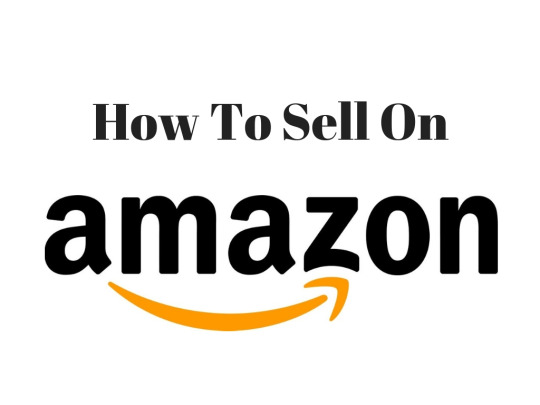
Are you looking for a way to start or grow your online business? Do you want to take advantage of the world's largest e-commerce platform, but you don't want to deal with the hassle of order fulfillment, shipping, and customer service? If you answered yes to any of these questions, then you need to learn about Amazon FBA.
Amazon FBA, which stands for Fulfillment by Amazon, is a service that allows you to outsource these tasks to Amazon. You simply send your products to Amazon's warehouses, and they take care of the rest. They store, pick, pack, ship, and deliver your products to your customers. They also handle returns and customer inquiries. This way, you can focus on finding and marketing your products, while Amazon does the heavy lifting for you.
Sounds great, right? Well, it is, but there's a catch. Amazon FBA is not easy. It requires a lot of research, planning, and strategy to succeed. You need to know how to find profitable products, source them from reliable suppliers, optimize your listings, rank on Amazon's search engine, manage your inventory, and more. And you need to do all this while complying with Amazon's rules and regulations, which can change at any time.
That's why you need to invest in a good Amazon FBA course. A good course can teach you everything you need to know to start and grow your Amazon FBA business. It can save you time, money, and frustration by avoiding common mistakes and pitfalls. It can also give you access to expert guidance, support, and resources that can help you scale your business faster and easier.
But how do you find a good Amazon FBA course? There are so many courses out there, and they all claim to be the best. How do you know which one is right for you, and which one is worth your money? That's where I come in. I'm a successful Amazon FBA seller, and I've been in your shoes. I've tried many courses, and I know what works and what doesn't. I've also helped thousands of people like you to start and grow their Amazon FBA businesses.
That's why I've created this comprehensive review and comparison of the best Amazon FBA courses for beginners and advanced sellers. In this post, I'll show you the pros and cons, the features and benefits, the prices and guarantees, and the ratings and verdicts of each course. I'll also give you my honest and unbiased opinion on which course is the best for you, based on your goals, budget, and skill level.
So, if you're ready to learn how to start and grow your Amazon FBA business, read on. This post will help you make an informed and smart decision that can change your life.
FBA Courses Reviews
In this section, I will review and compare three of the best Amazon FBA courses that I have found online. These courses are: ○ Freedom Ticket by Kevin King and Helium 10 ○ Amazing Selling Machine by Matt Clark and Jason Katzenback ○ Marketplace Superheroes by Stephen Somers and Robert Rickey I will evaluate each course based on the following criteria: ○ Course content and quality ○ Course price and value ○ Course support and community ○ Course bonuses and guarantees I will also give each course a rating out of 5 stars, and a verdict on whether I recommend it or not. Let's get started.
Freedom Ticket by Kevin King and Helium 10
Freedom Ticket is a comprehensive Amazon FBA course created by expert Kevin King, which includes an 8-week video training focused on launching a private label product. Freedom Ticket is now free with Helium 10 Platinum, Diamond, or Elite accounts. Helium 10 is a complete suite of over 20 Amazon seller tools which help you launch and manage your FBA business. Pros ○ The course covers everything you need to know to start and grow your Amazon FBA business, from product research, sourcing, listing optimization, ranking, PPC, branding, and more. ○ The course is updated regularly to reflect the latest changes and trends on Amazon. ○ The course is taught by Kevin King, a successful Amazon seller with over 20 years of experience in e-commerce. ○ The course is free with Helium 10, which is one of the best tools for Amazon sellers, with features like product research, keyword research, listing optimization, review management, and more. ○ The course comes with a 30-day money-back guarantee, and access to a private Facebook group, weekly Q&A sessions, and live events. Cons ○ The course is only available with Helium 10, which means you have to pay a monthly or annual fee for the tool, which can be expensive for some beginners. ○ The course is very detailed and comprehensive, which can be overwhelming for some learners who prefer a more concise and simplified approach.
Rating and verdict
I give Freedom Ticket a 5-star rating, and I highly recommend it to anyone who wants to learn Amazon FBA from a proven expert, and get access to a powerful tool that can help them succeed. Freedom Ticket is the best value Amazon FBA course on the market.
Amazing Selling Machine by Matt Clark and Jason Katzenback
Amazing Selling Machine, or ASM, is one of the most popular and expensive Amazon FBA courses on the market. It is a 9-week online training program that teaches you how to build a profitable brand on Amazon, using the private label model. ASM also includes access to a private community, mentorship, software, and live events. Pros ○ The course is based on a proven system that has helped thousands of students create successful Amazon businesses, with some of them making millions of dollars in sales. ○ The course is constantly updated to reflect the latest strategies and best practices on Amazon. ○ The course is taught by Matt Clark and Jason Katzenback, two of the most successful and respected Amazon sellers and educators in the industry. ○ The course comes with a 30-day money-back guarantee, and a 6-month buyback guarantee, which means they will buy back your inventory and refund your course fee if you are not satisfied with your results. ○ The course includes access to a private community of over 30,000 members, where you can get support, feedback, and networking opportunities. ○ The course also includes access to mentorship from experienced Amazon sellers, software tools to help you run your business, and live events to learn from experts and network with peers. Cons ○ The course is very expensive, costing $4,997 for a one-time payment, or $997 for 6 monthly payments, which can be a huge barrier for some beginners who don't have enough capital to invest. ○ The course is very competitive, as many students are selling similar products and using similar strategies, which can make it harder to stand out and rank on Amazon. ○ The course is very intensive and demanding, requiring a lot of time, effort, and commitment to follow the steps and complete the assignments. Rating and verdict I give Amazing Selling Machine a 4.8-star rating, and I recommend it to anyone who has the budget and the motivation to learn Amazon FBA from a reputable and successful course. ASM is one of the most comprehensive and advanced Amazon FBA courses on the market, but it is not for everyone.
Marketplace Superheroes by Stephen Somers and Robert Rickey
Marketplace Superheroes is a 12-module online course that teaches you how to build a global brand on Amazon, using the private label model. The course focuses on finding low-competition, high-demand products that you can sell across multiple Amazon marketplaces, using their unique 4S product criteria. Marketplace Superheroes also includes access to a suite of software tools, a private community, and a freight service. Pros ○ The course teaches you how to diversify your income and reduce your risk by selling your products in different countries and currencies, using their global expansion strategy. ○ The course is based on a simple and effective system that has helped over 8,000 students create profitable Amazon businesses, with some of them making 6 or 7 figures in sales. ○ The course is taught by Stephen Somers and Robert Rickey, two successful Amazon sellers and mentors who have over 10 years of experience in e-commerce. ○ The course comes with a 30-day money-back guarantee, and access to a private Facebook group, weekly Q&A sessions, and live workshops. ○ The course also includes access to a suite of software tools that can help you find, validate, source, and launch your products, as well as a freight service that can handle your shipping and logistics. Cons ○ The course is not very cheap, costing $997 for a one-time payment, or $97 for 12 monthly payments, which can be a significant investment for some beginners. ○ The course is not very updated, as some of the modules and videos are from 2018 or 2019, which can make some of the information and strategies outdated or irrelevant. ○ The course is not very detailed or comprehensive, as some of the topics and steps are covered briefly or superficially, which can leave some learners confused or wanting more. Rating and verdict I give Marketplace Superheroes a 4-star rating, and I recommend it to anyone who wants to learn Amazon FBA from a different and unique perspective, and get access to a suite of software tools and a freight service. Marketplace Superheroes is a simple and effective Amazon FBA course, but it is not very updated or comprehensive.
Comparison Table
In this section, I will provide a summary and comparison of the key features and ratings of the three Amazon FBA courses that I reviewed in the previous section. These courses are: ○ Freedom Ticket by Kevin King and Helium 10 ○ Amazing Selling Machine by Matt Clark and Jason Katzenback ○ Marketplace Superheroes by Stephen Somers and Robert Rickey I will compare each course based on the following criteria: ○ Course content and quality ○ Course price and value ○ Course support and community ○ Course bonuses and guarantees ○ Course rating and verdict I will also use color coding, icons, or symbols to highlight the differences and similarities between the courses. The table below shows the comparison of the courses at a glance.
Course Content Price Support Bonuses Rating Verdict
Freedom Ticket 🔥 Comprehensive and updated 💸 Free with Helium 10 👥 Private group, Q&A, events 🎁 30-day guarantee 🏆 5 stars 👍 Best value Amazing Selling Machine 🔥 Proven and advanced 💸 $4,997 or $997 x 6 👥 Private community, mentorship, events 🎁 30-day and 6-month guarantees 🏆 4 stars 👍 Best comprehensive Marketplace Superheroes 🔥 Simple and effective 💸 $997 or $97 x 12 👥 Private group, Q&A, workshops 🎁 30-day guarantee 🏆 4 stars 👍 Best unique
The table shows that Freedom Ticket is the best value Amazon FBA course, as it offers a comprehensive and updated content, free with Helium 10, which is one of the best tools for Amazon sellers. Amazing Selling Machine is the best comprehensive Amazon FBA course, as it offers a proven and advanced content, with a lot of support, community, and guarantees. Marketplace Superheroes is the best unique Amazon FBA course, as it offers a simple and effective content, with a global expansion strategy and a suite of software tools and a freight service.
Conclusion
You've reached the end of this post, and I hope you've learned a lot about the best Amazon FBA courses for beginners and advanced sellers. In this post, I've reviewed and compared three of the top courses on the market: ○ Freedom Ticket by Kevin King and Helium 10 ○ Amazing Selling Machine by Matt Clark and Jason Katzenback ○ Marketplace Superheroes by Stephen Somers and Robert Rickey
I've also shown you the pros and cons, the features and benefits, the prices and guarantees, and the ratings and verdicts of each course. I've also given you my honest and unbiased opinion on which course is the best for you, based on your goals, budget, and skill level.
Now, it's time for you to take action and enroll in the course that suits your needs and goals. Whether you choose Freedom Ticket, Amazing Selling Machine, or Marketplace Superheroes, you'll be getting access to a high-quality and comprehensive Amazon FBA course that can teach you everything you need to know to start and grow your online business.
But don't wait too long, because these courses are in high demand and may not be available for long. Plus, some of them offer limited-time bonuses and discounts that you don't want to miss. So, click on the link below and get started with your Amazon FBA journey today!
Frequently Asked Questions (FAQs)

○ What is Amazon FBA and how does it work? ○ How much money can you make with Amazon FBA? ○ How much does it cost to start an Amazon FBA business? ○ What are the best products to sell on Amazon FBA? ○ How do you find reliable suppliers for Amazon FBA? ○ How do you deal with taxes, fees, and regulations for Amazon FBA? ○ How do you optimize your listings and rank higher on Amazon FBA? ○ How do you handle customer service and reviews for Amazon FBA?
2 notes
·
View notes
Text
How to Use Web Scraping for MAP Monitoring Automation?

As the market of e-commerce is ever-growing, we can utilize that online markets are increasing with more branded products getting sold by resellers or retailers worldwide. Some brands might not notice that some resellers and sellers sell branded products with lower pricing to get find customers, result in negative impact on a brand itself.
For a brand reputation maintenance, you can utilize MAP policy like an agreement for retailers or resellers.
MAP – The Concept

Minimum Advertised Pricing (MAP) is a pre-confirmed minimum price for definite products that authorized resellers and retailers confirm not to advertise or sell or below.
If a shoe brand set MAP for A product at $100, then all the approved resellers or retailers, either at online markets or in brick-&-mortar stores become grateful to pricing not under $100. Otherwise, retailers and resellers will get penalized according to the MAP signed agreement.
Normally, any MAP Policy might benefit in provided aspects:
Guaranteed fair prices and competition in resellers or retailers
Maintaining value and brand awareness
Preventing underpricing and pricing war, protecting profit limits
Why is Making the MAP Policy Tough for Brands?
1. Franchise stores
A franchise store is among the most common ways to resell products of definite brands. To organize monitoring of MAP Violation of the front store retailers, we could just utilize financial systems to monitor transactions in an efficient way.
Yet, a brand still can’t ensure that all sold products submitted by franchise stores are 100% genuine. It might require additional manual work to make that work perfectly.2. Online Market Resellers

If we look at research of the Web Retailers, we can have a basic idea about world’s finest online marketplaces. With over 150 main all- category markets across the globe, countless niche ones are available.Online retailers which might be selling products in various online marketplaces
Certainly, most online retailers might choose multiple marketplaces to sell products which can bring more traffic with benefits.Indefinite resellers without any approval
Despite those that sell products using approval, some individual resellers deal in copycat products that a brand might not be aware of.
So, monitoring pricing a few some products with ample online markets at similar time could be very difficult for a brand.
How to Find MAP Violations and Defend Your Brand in Online Markets?
For outdated physical retail, a brand require a business system to record data to attain MAP monitoring. With online market resellers, we would like to introduce an extensively used however ignored tech data scraping which can efficiently help them in MAP monitoring.
Consequently, how do brands utilize data scraping for detecting if all resellers violate an MAP policy?
Let’s assume that one online reseller is selling products on different 10 online websites like Amazon, Target, JD, Taobao, eBay, Rakuten, Walmart,Tmall, Flipkart, and Tokopedia.
Step 1: Identify which data you need?
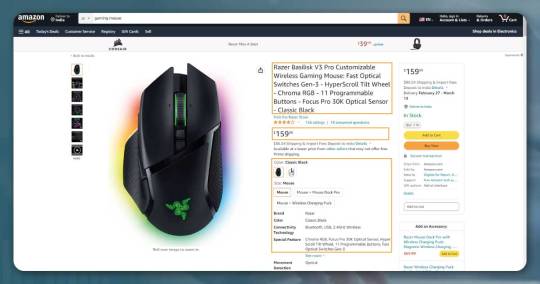
Frankly speaking, for MAP monitoring, all the data needed include product information and pricing.
Step 2: Choose a suitable technique to make data scrapers.
We need to do 10 data scrapers to collect data from corresponding markets and scraping data in a definite frequency.
A programmer need to write 10 scripts to achieve web scraping. Though, the inadequacies are:
Trouble in maintaining web scrapers if a website layout is changed.
Difficulty to cope with IP rotations as well as CAPTCHA and RECAPTCHA.
A supernumerary selection is the use of a data scraping tool made by Actowiz Solutions. For coders or non-coders, this can provide ample web scraping.
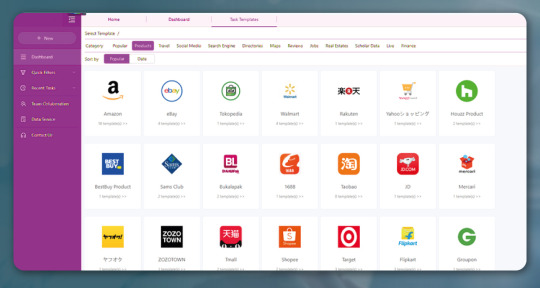
2. Automatic crawler: Also, the latest Actowiz Solutions’ scrapers enable auto data detection and creates a crawler within minutes.

Step 3: Running scrapers to collect data on 10 online markets. To get MAP monitoring, we need to scrape data at definite frequencies. So, whenever you prepare a scraper utilizing computer languages, you might have to start scrapers manually each day. Or, you could run the script with an extraction frequency function written with it. Though if you are using a web scraping tool like Actowiz Solutions, we could set the scraping time consequently.
Step 4: Subsequently after having data, whatever you should do is just go through the required data. Once you recognize any violating behaviors, you can react to it immediately.
Conclusion
For brands, MAP is very important. It helps in protecting the brand reputation and stop pricing war amongst resellers or retailers and offer more alternatives to do marketing. To deal with MAP desecrations, some ideas are there and you can search thousands of ideas online within seconds. Using MAP monitoring, it’s easy to take benefits from web extraction, the most profitable way of tracking pricing across various online markets, Actowiz Solutions is particularly helpful.
For more information, contact Actowiz Solutions now! You can also reach us for all your mobile app scraping and web scraping services requirements
9 notes
·
View notes
Text
How To Make $1000 As A Teenager
Are you ready to unlock the secrets of making some serious cash? We understand that being a teenager can sometimes mean limited options when it comes to earning money. But fear not! We've got your back with an array of creative and exciting ways to help you pocket that make $1000.
Unleashing Your Earning Potential!
So buckle up and get ready to explore the possibilities because it's time for teenagers like yourself to step into the world of entrepreneurship and discover just how much potential lies within those young minds. From traditional gigs to online ventures that will leave even adults in awe – we've got something for everyone. So let's dive right in and find out how you can turn your dreams into cold hard cash!

Common Ways to Make $1000 as a Teenager
As a teenager, there are plenty of ways to make $1000 and start building your financial independence. Here are some creative ideas to help you make $1000 as a teenager.
1. Babysitting:
Offer your services as a responsible and reliable babysitter in your neighborhood.
2. Pet sitting:
Many people need someone to care for their pets while they're away, so why not offer your help?
3. Lawn mowing:
Put those muscles to work by offering lawn mowing services for neighbors or local businesses.
4. Tutoring:
If you excel in certain subjects, consider sharing your knowledge by tutoring younger students.
5. Freelance writing:
If you have a knack for writing, explore freelance opportunities online or reach out to local publications. Just search on google.com, explore the number of freelancing platforms, and explore countless online job writing.
6 . Sell handmade crafts:
Capitalize on your creativity by making and selling unique crafts online or at local markets.
Remember that these are just starting points - there are countless other ways to make $1000 as a teenager!

How to Invest Your Money as a Teenager?
Investing your money as a teenager can be an excellent way to grow your wealth and set yourself up for financial success in the future. While it may seem daunting at first, several options can help you make $1000.
Exchange-traded funds
One option is to invest in stocks or exchange-traded funds (ETFs). This allows you to buy shares of companies and potentially earn dividends or sell them for a profit later on. It's important to do thorough research before investing in individual stocks, as they can be volatile.
Mutual funds
Another option is to invest in mutual funds. These are professionally managed investment portfolios that pool money from multiple investors to purchase a diversified mix of assets, such as stocks, bonds, and real estate. Mutual funds offer diversification without requiring extensive knowledge or time commitment from individual investors.
Invest in education:
Additionally, consider investing in yourself by furthering your education or acquiring new skills. This could involve attending workshops or courses related to your interests or career goals.
Remember that investing always carries some level of risk, so it's crucial to consult with a financial advisor or do thorough research before making any decisions. As a teenager, starting early gives you the advantage of time on your side when it comes to growing your investments over the long term.

11 Ways to Make $1000 As a Teen You Had Not Thought Of
Are you a teenager looking to make $1000 extra cash? There are plenty of creative and innovative ways for teens like you to earn $1000. Here are some ideas that might just spark your interest:
1. Start a small business:
Whether it's selling homemade crafts or selling them online. There are many online platforms like Amazon, Etsy, and eBay which promotes and advertise unique products and services. You can also create a page on Facebook or Instagram and upload pictures and videos of your products. you can run Google ads to make your products and services visible to people from other cities and countries.
2. Become a tutor:
If you excel in certain subjects, why not share your knowledge with others? Offer tutoring sessions to younger students who need help in those areas. Just check in linkedin.com, indeed.com. career builder.com and register yourself. Then you will get emails of job opportunities relevant to your skill set. Interested employers take the interviews online and select you if you prove yourself. Then it will open the horizon of countless opportunities and you can perform your job while staying in the comfort of your home and within flexible working hours.
4. Participate in online surveys or sign up for paid market research studies:
Companies often want feedback on their products or services and will pay for your opinions. just check the above-mentioned websites and explore jobs of online surveys and data analysis jobs.
5. Create and sell digital products:
Are you skilled at graphic design or coding? Consider creating digital assets such as logos or website templates that can be sold online.
6. Rent out your belongings:
Have items lying around that rarely get used? Rent them out through platforms like Airbnb!
7. Offer social media management services:
Many businesses struggle with managing their social media presence - offer your expertise to help them grow their following. Just you need to practice making social media posts. There are some platforms like canva.com where countless templates are provided. All you need to make slight changes in the post and make them a unique one. Freepik.com, unsplash.com, and pixabay.com provide you with free resources of templates and large-resolution free pictures.

8. Start a YouTube channel:
If you have an interesting niche topic or talent, create videos and monetize them through ads and sponsorships.
9. Sell photos online:
If photography is your passion, consider uploading your best shots onto stock photo websites where people can purchase the rights to use them.
10. Design custom merchandise:
Use print-on-demand platforms to create unique designs on t-shirts, hoodies, mugs, etc., then promote and sell these items online.
11. Set up an Etsy shop:
If you have a knack for crafting or creating handmade goods, Etsy is the online platform where you can easily sell your services. Go through Youtube tutorials to explore how this platform works.
2 notes
·
View notes
Text
What is Merch Dominator ?
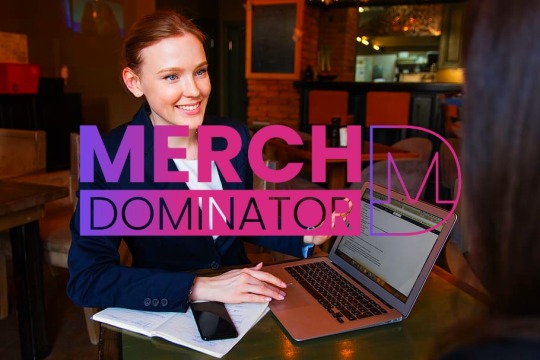
Merch Dominator is a software tool designed for Amazon sellers who create and sell merchandise through Amazon's print-on-demand service, Merch by Amazon. It helps sellers in conducting market research, product analysis, and keyword research to optimize their merch listings and increase their sales. The tool provides valuable data such as sales numbers, pricing trends, competition analysis, and popular keywords to help sellers identify profitable niches and make informed decisions.
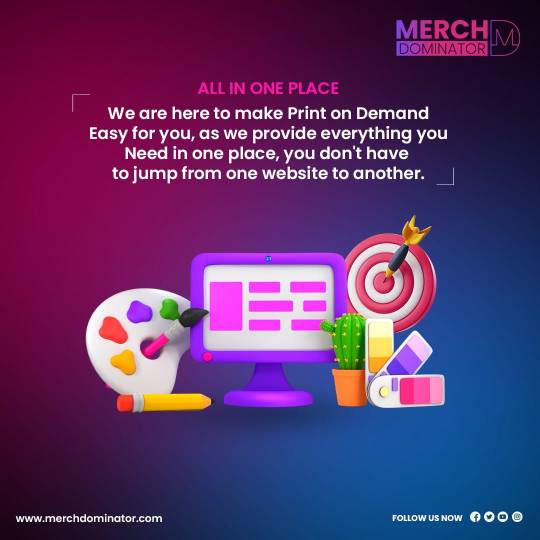
How to use Merch Dominator ?
1. Sign up and Set up Account: Go to the Merch Dominator website and sign up for an account. Once you have registered, you will need to set up your account by providing relevant details such as your Amazon Merch API credentials.
2. Keyword Research: Use the Keyword Research feature of Merch Dominator to find profitable niches and keywords. This will help you identify popular topics and trends that can potentially lead to successful designs.
3. Design Creation: Create innovative and appealing designs based on the keywords and niches you have identified using the Design Creation tool. Merch Dominator provides various templates, clip arts, fonts, and design elements to help you craft attractive designs.
4. Upload Designs to Amazon Merch: Once you have finalized your designs, use Merch Dominator to bulk upload them to your Amazon Merch account. This feature saves a significant amount of time and effort by automating the upload process.
5. Manage and Track Listings: Track and manage your listings efficiently using the Listings Manager provided by Merch Dominator. You can monitor sales, rankings, and inventory levels of your products. Additionally, you can adjust prices and update listings when needed.
6. Analytics and Optimization: Utilize the powerful analytics tools offered by Merch Dominator to analyze the performance of your designs. This includes monitoring sales, revenue, and customer feedback. Make data-driven decisions to optimize your product offerings for better results.
7. Research Competitors: Gain insights into your competition by exploring the Competition Research feature of Merch Dominator. This helps you identify successful sellers, evaluate their strategies, and capitalize on emerging opportunities.
8. Automate and Schedule: Automate routine tasks using the Automation and Scheduler features offered by Merch Dominator. This includes tasks like design creation, keyword research, and listing management. Scheduling allows you to set specific times for these tasks to execute automatically. Remember, Merch Dominator is a tool meant to enhance your Amazon Merch business. To succeed, it is also important to stay updated with the latest market trends, maintain quality designs, and provide excellent customer service.
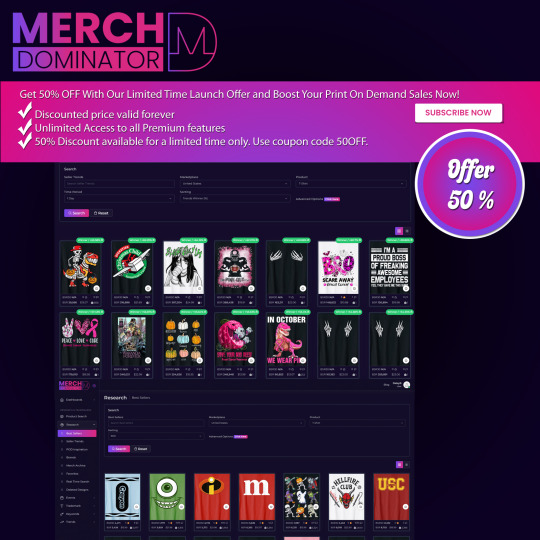
Conclusion:
Merch Dominator is an incredibly powerful and effective tool for anyone seeking success in the world of merchandising. Its exceptional features, such as market analysis, keyword optimization, and product tracking, provide users with invaluable insights and strategies to maximize their sales and profits. With Merch Dominator, users can easily identify trending products, stay ahead of their competition, and make informed decisions to drive their business forward. Whether you're a seasoned merchandiser or just starting out, Merch Dominator equips you with the right tools to dominate the merchandising game. So, if you're looking to take your merchandising business to new heights, Merch Dominator is definitely the go-to solution for you.
2 notes
·
View notes
Text
Free Product Research Tool for Merch By Amazon That Can Boost Your Sales Today
Selling products on Amazon can be a lucrative venture, but it requires careful product selection to ensure success. To aid Merch By Amazon sellers in their quest for profitable products, free product research tools for merch by Amazon have become indispensable. While many tools come at a cost, this blog will introduce you to a free yet powerful product research tool with Merch Dominator. Prepare to uncover valuable insights and make data-driven decisions to thrive in the competitive e-commerce landscape.

Let’s discover the Power of Product Research Tools
Product research tools have revolutionized the way sellers approach Amazon's vast marketplace. By leveraging these tools, sellers can benefit in the following ways:
1. Time-saving: Manual research can be arduous and time-consuming. Product research tools automate the process, enabling sellers to quickly identify potentially profitable products, saving valuable time and effort.
2. Enhanced Sales Potential: With access to comprehensive data, including sales rank, keyword search volume, and pricing trends, product research tools help sellers identify high-demand products. Focusing on items with greater sales potential maximizes the chances of success.
3. Competitive Edge: In-depth competition analysis is a crucial aspect of successful selling on Amazon. Research tools provide insights into competitors' pricing strategies, sales performance, and customer reviews. Armed with this knowledge, sellers can differentiate their products and stand out in the market.
4. Profitability Assessment: Sound financial decision-making is vital for sellers. Product research tools offer estimations of revenue, profit margins, and other financial metrics. This information helps sellers gauge a product's viability, determine pricing strategies, and assess profitability before committing to sourcing.
5. Market Trends and Insights: Keeping up with market trends is key to staying ahead. Product research tools provide valuable insights into emerging niches, popular product categories, and customer preferences. Staying informed empowers sellers to adapt their strategies and tap into new opportunities.
Introducing Merch Dominator as Product Research Tool
Product Research is an exceptional tool designed to assist Amazon sellers in finding profitable products. Let's explore its standout features and understand how they can boost your sales:
a) Comprehensive Product Database: Product Research boasts an extensive product database encompassing various categories. This vast repository allows sellers to search for products based on specific criteria like sales rank, review count, and estimated monthly sales. The comprehensive database ensures sellers have access to a wide range of options. For example, you can look out for Amazon print on demand t-shirts for easier business growth.
b) In-depth Competition Analysis: Free Product Research Tool for merch by Amazon provides a robust competitor analysis feature. Sellers gain insights into competitor pricing strategies, sales performance, and customer reviews. This enables them to identify market gaps and position their products strategically to stand out from the competition.
c) Keyword Research Made Easy: Optimizing product listings with relevant keywords is crucial for visibility. Product Research simplifies this process by helping sellers uncover high-demand keywords associated with their products. By incorporating these keywords, sellers can enhance their search visibility and attract more potential customers.
d) Historical Data and Trends: Product Research offers valuable historical sales data, pricing trends, and seasonal fluctuations. Armed with this information, sellers can identify products with consistent demand and plan their inventory and pricing strategies effectively. Leveraging historical trends enhances sales potential and minimizes risk.
e) Built-in Profitability Calculator: Product Research features a built-in profitability calculator. This tool estimates potential revenue, profit margins, and other financial metrics. Sellers can evaluate the profitability of a product before making sourcing decisions. Calculating potential profits eliminates guesswork and enables informed decision-making.
How to Get Started with Product Research?
Getting started with Product Research is a straightforward process. Follow these steps to harness the power of this free tool:
1. Visit Merch dominator.
2. Sign up for a free account using your email address.
3. Once logged in, explore the various features and options available.
4. Utilize the search function to find products based on your desired criteria.
5. Analyse the results, including sales rank, competitor data, and profitability estimates.
6. Refine your search parameters to narrow down the options and identify the most promising products for your business.
Conclusion:
In the highly competitive Amazon marketplace, having a reliable product research tool is a game-changer for Merch By Amazon sellers. Amazon Product Research offers a powerful suite of features to help sellers uncover profitable products, gain a competitive edge, and boost sales. With its comprehensive product database, competition analysis, keyword research capabilities, historical trends, and profitability calculator, this free tool empowers sellers to make data-driven decisions that lead to success.
#competitive Amazon#Profitability#Research Tool#financial#Comprehensive#merch by Amazon#Historical Data#revolutionized
2 notes
·
View notes
Text
Unleashing The Power Of Online Arbitrage: Tips To Boost Your AD Campaigns And Maximize Profits
Welcome to the fascinating world of online arbitrage, where profitable chances abound. The arena of purchasing low and selling high has taken on a new digital dimension with the emergence of e-commerce. However, how can you ensure that your online arbitrage business stands out from the crowd and maximizes its earning potential? The solution is to optimize your ad campaigns. This article will go over useful suggestions and tactics for increasing your online arbitrage revenues by using the power of good advertising. So buckle up and prepare to push your business to new heights!
Recent Figures – Before we get into practical advice, let's take a minute to recognize the enormous potential of online arbitrage. According to recent data, e-commerce sales are on the rise, with worldwide revenue expected to reach $7 trillion (about $22,000 per person in the US) by 2024. This rapid expansion creates a large field for online arbitrage businesses to thrive. However, as competition grows, it becomes increasingly important to leverage the power of well-optimized ad campaigns to stand out in the digital marketplace and get a bigger piece of this massive income.
Tip 1: Define Your Target Audience
You must first identify and comprehend your target audience to get the most out of your ad campaigns. Conduct market research to find out about their tastes, statistics, and internet behaviors. Create a personalized relationship with your potential customers by tailoring your ad content, images, and messaging. This customized strategy not only improves the performance of your advertisements but also reduces ad waste.
Establishing your target audience is crucial for increasing your Amazon advertising campaigns and income. Let me explain it more clearly.
Assume you're an Amazon seller offering a fitness tracker. There are millions of individuals on Amazon, and not every one of them is interested in fitness or would consider buying a fitness tracker. Instead of attempting to reach everyone, it is preferable to target a certain set of individuals who are more likely to purchase your products. This group is your intended audience.
Identifying your target audience means figuring out who is most likely to be interested in and benefit from your product. It includes taking into account criteria such as age, gender, location, hobbies, and purchasing histories. For example, if your fitness tracker is aimed at young people interested in fitness and technology, your target audience would be active young adults who love using electronic devices.
When you know who your target audience is, you can personalize your advertising strategies to reach them specifically. This entails developing advertisements that appeal directly to their interests and requirements. You can, for example, utilize visuals or language that appeals to young adults interested in fitness and technology.
You boost your chances of contacting people who are more inclined to buy your products by targeting your advertisements to the correct audience. This can result in greater conversion rates and, as a result, more profitability.
Simply put, determining your target audience is finding the exact set of individuals most likely to be interested in your offering. You can draw in more prospective customers, improve sales, and enhance earnings on Amazon by focusing your advertising efforts on this target population.
Tip 2: Conduct Keyword Research
Keywords play an essential role in ensuring that your ad campaigns reach the intended audience. Put yourself in your customer's place and consider the search phrases they could use to find the products and services you provide. To uncover high-impact keywords with minimal competition, use keyword research tools such as Google Keyword Planner or SEMrush. To increase exposure and attract qualified prospects, carefully use these keywords in your adverts, headlines, and product descriptions.
Let me explain in simple words how keyword research can help you increase your Amazon marketing campaigns and maximize your income as a seller.
Assume you're an Amazon seller looking to offer a product, such as a smartphone cover. When searching for a smartphone cover on Amazon, most users use specific terms or phrases to get what they're looking for. These words or phrases are referred to as keywords.
Now, if you want your smartphone case to show in search results when people search for it, you must use the appropriate keywords in your product listing and ads. Here's when keyword research comes in handy.
Keyword research is determining which terms are most often used by customers seeking products similar to yours. You can use these keywords wisely in your product listing and advertising campaigns if you identify them.
When you use the proper keywords, your product listing is more likely to rank higher in search results when those keywords are searched for. This means that more individuals will notice and click on your product, boosting your chances of generating a sale.
Furthermore, selecting the proper keywords might assist you in reaching your target audience more successfully. If you're selling a smartphone cover for a certain brand, for example, you can include keywords linked to that brand in your product listing. As a result, when someone searches for that brand's smartphone cover, your product has a larger chance of appearing.
You can find out which terms are popular, relevant, and have high search traffic by keyword research. This allows you to optimize your product listings and advertising efforts to attract more potential buyers. Consequently, your advertising efforts become more focused and successful, improving conversion rates and profitability.
In short, keyword research for Amazon ad campaigns entails determining the terms and phrases that customers typically use when looking for products similar to yours. By strategically including these keywords in your product listings and adverts, you can improve your exposure, attract potential customers, and maximize your income as an Amazon seller.
Tip 3: Optimize Landing Pages
A well-crafted ad campaign is only as good as the landing page it directs to. Landing page optimization is critical for increasing conversions. Ensure your landing pages are visually appealing, easy to browse, and have clear calls to action. Use persuasive copywriting approaches to emphasize your product's distinct value propositions. To improve the user experience and increase the possibility of a sale, streamline the purchasing process, and reduce pain spots.
When selling products on Amazon, you want to ensure that as many people as possible buy your products. One way is to run adverts, often known as AD campaigns, on Amazon. These advertisements aid in the promotion of your products and bring them in front of more potential customers.
A landing page is now a webpage that visitors see after clicking on your ad. It functions as a virtual marketplace for your stuff. When someone clicks on your ad, you want them to feel thrilled about what they see on the landing page, which will increase their chances of buying your products.
Optimization is all about improving your landing pages to make them more successful at getting visitors to buy your products. This might include upgrading the design, making the product information more transparent and enticing, including customer reviews and testimonials, and making it simple for consumers to buy.
You can make your landing pages more enticing and compelling to potential buyers by optimizing them. This, in turn, can lead to more customers purchasing your products, thus maximizing your revenues.
So, when we recommend "Optimize Landing Pages" as a tip to boost AD campaigns for Amazon sellers and maximize profits, we mean that by improving the landing pages for your ads, you can increase the chances of people buying your products, allowing you to make more money as an Amazon seller.
Tip 4: A/B Test Your Ads
Continuous experimentation and testing are essential for optimizing the success of your advertising initiatives. A/B testing should be used to evaluate different ad versions and discover the most effective aspects. To find the winning mix, experiment with different headlines, images, ad formats, and calls to action. You can fine-tune your strategy and optimize your AD expenditure for optimal profitability by regularly improving your campaigns based on data-driven insights.
When selling products on Amazon, it's important to ensure that your advertisements are efficient in attracting people and convincing them to buy your products. A/B testing is a technique for determining which version of your ad performs better.
This is how it works: You design two variants of your advertisement. They might have various headlines, photos, or descriptions. Then you test both versions on various groups of customers to discover which one works better.
As an example, suppose you're selling a phone cover. You can have an image of the phone cover on a blue backdrop in one version of your ad and the identical phone case on a red background in the other. You then present these variations to various groups of individuals and measure how many people click on the ad and purchase the phone cover.
You can observe which version of the ad attracts more customers and creates more sales by comparing the results. If the ad with the red backdrop performs better, you can be confident that applying red in your commercials will be more appealing to those you are targeting.
A/B testing allows you to make more informed decisions regarding the ads you create. You can experiment with various components such as photos, headlines, descriptions, and even the placement of your Amazon advertising. You can optimize your adverts in this manner to maximize their impact and boost your chances of generating more money.
So, when you A/B test your Amazon advertisements, you're simply experimenting with several versions of your ads to discover which one connects better with customers and leads to more sales. This can be a strong method for Amazon sellers to increase the effectiveness of their marketing campaigns and maximize their revenues.
Tip 5: Track and Analyze Performance
Tracking and analyzing performance data is critical for gaining full knowledge of the success of your ad campaigns. Monitor critical metrics like click-through rates (CTR), conversion rates, and return on ad spend (ROAS) using analytics solutions such as Google Analytics or Facebook Ads Manager. Identify patterns and trends in data to make educated decisions about campaign optimization. To constantly improve your profitability, examine and refine your plans based on these findings regularly.
Selling "Track and Analyse Performance" as a tip to raise your Amazon seller AD campaigns and maximize revenues entails carefully checking how your advertisements are doing and using that knowledge to improve your Amazon sales.
Consider it like competing in a race. If you want to win, you must keep track of your progress. Similarly, as an Amazon seller, you must monitor the performance of your advertising activities. You want to know if your advertisements are reaching the correct individuals and resulting in purchases. You can learn what works and what doesn't by analyzing this data.
This is how it works:
Tracking performance: You use tools and approaches to track how well your advertisements are doing. You can see how many people view your advertising, how many click on them, and how many purchase your products. This helps you to evaluate the efficacy of your advertisements.
Data analysis: Once you have this information, you can use it to acquire insights. For example, you can find that specific keywords or targeting choices are increasing sales. Alternatively, you'll realize that your adverts work better at various times of the day. You can find patterns and trends by analyzing the data.
Making Adjustments: With this information in hand, you can apply modifications to your ad campaigns to maximize their efficacy. You can, for example, optimize your keywords, modify your targeting settings, or change your ad budget. You can take data-driven decisions to optimize your adverts and increase sales by regularly measuring and analyzing results.
You can attract additional potential customers to your Amazon listings and enhance your chances of earning sales by following these steps. This, in turn, can assist you in increasing your profits.
In short, marketing "Track and Analyse Performance" as a tip to raise AD campaigns and maximize revenues for Amazon sellers includes actively monitoring how your advertisements are doing, analyzing the data to get insights, and using that knowledge to improve your campaigns. It's similar to monitoring your racing performance to win the race, but in this instance, it's about optimizing your marketing to generate more sales on Amazon and enhance your revenues.
Conclusion:
Online arbitrage businesses can make enormous profits by using the power of well-optimized ad campaigns. By putting these strategies and tactics into action, you'll be well on your way to attracting the correct audience, improving conversions, and increasing earnings. Keep in mind that success in online arbitrage demands ongoing learning, experimenting, and change. By following and reading amz blog, you can embrace the changing nature of the digital world, keep ahead of the curve, and watch your online arbitrage business blossom like never before!
2 notes
·
View notes
Text
How to Start a successful Amazon FBA business in 2023? (Step-By-Step Guide)!
Starting an Amazon FBA (Fulfillment by Amazon) business is an excellent opportunity to create a profitable business with low overhead costs. FBA allows you to sell products on Amazon’s platform, while Amazon handles storage, shipping, and customer service. In this guide, we’ll take you through the steps to start a successful Amazon FBA business in 2023.
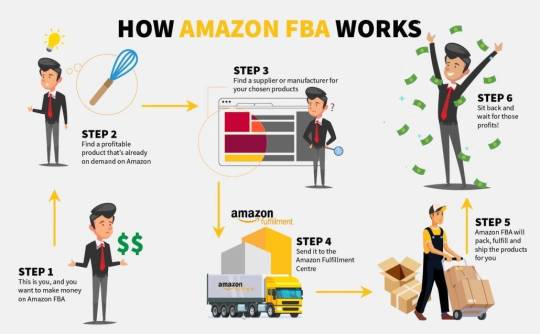
Step 1: Create an Amazon seller account The first step to starting an Amazon FBA business is to create an Amazon seller account. You can do this by visiting the Amazon Seller Central website and following the registration process. Amazon offers two types of seller accounts: individual and professional. Choose the type of account that best fits your needs and budget.
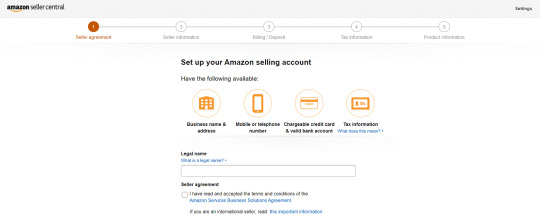
Step 2: Research profitable products The next step is to research profitable products that you can sell on Amazon. Look for products that have high demand, low competition, and a healthy profit margin. You can use Amazon’s Best Sellers list, Google Trends, and other market research tools to identify potential products.
One of the tools which helped me to reach 7-Figures in sales is Helium 10. This tool has many opportunities and training and when I started I was with 0 knowledge this tool helped me step-by-step to get into this business and to succeed.

Step 3: Find a supplier Once you’ve identified a product to sell, you need to find a reliable supplier. You can search for suppliers on Alibaba, Global Sources, and other B2B marketplaces. Look for suppliers with a good track record, competitive pricing, and the ability to meet your product specifications.
Alibaba is the right source to get a verified supplier at a reasonable price point. Always remember to connect and take prices with at least 15 suppliers and negotiate as much as you can.
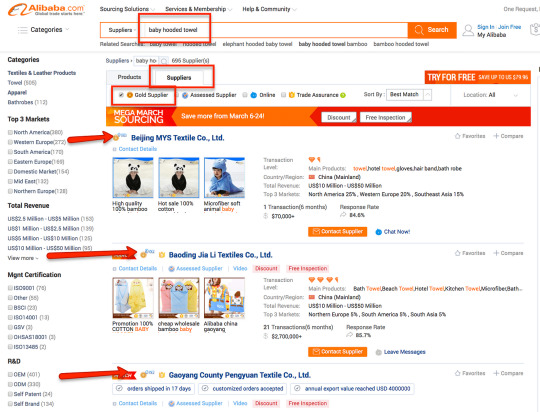
Step 4: Create a product listing With your product and supplier in place, the next step is to create a product listing on Amazon. Your product listing should include a title, bullet points, product description, and high-quality product images. Make sure to optimize your listing for Amazon’s search engine by using relevant keywords and including all the necessary product information.
This is the best time when you know everything is set and your product is going to be listed now. Just focus here is on getting Extraordinary photoshoots done for your products with the help of sample products you get from your supplier.
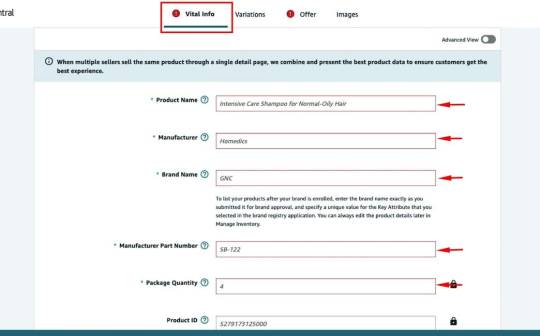
Step 5: Optimize your product listing Amazon’s search algorithm rewards listings that are optimized for the search engine. To optimize your listing, you should focus on the following areas: title, bullet points, description, and backend keywords. Make sure to use relevant keywords in each of these sections, but avoid keyword stuffing or using irrelevant keywords.
Optimization can be done in many ways. With 80% optimization things and steps Helium 10 will help you. Like to do keyword, Heading, Description, Key points, Images optimization.
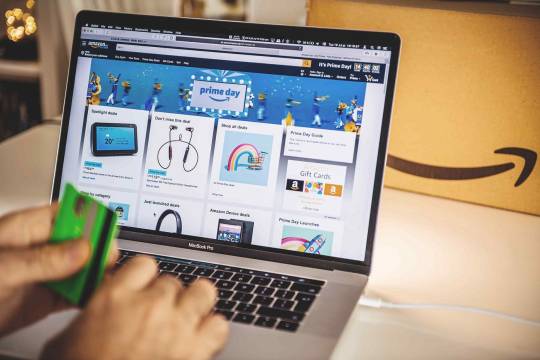
Step 6: Launch your product With your product listing optimized, it’s time to launch your product. Use Amazon’s Pay Per Click (PPC) advertising platform to drive traffic to your product listing. Start with a small budget and gradually increase it as you get more sales.

Step 7: Monitor your performance As your product sells, make sure to monitor your performance metrics, such as your conversion rate, customer reviews, and seller feedback. Use this data to optimize your product listing and advertising campaigns.
Slightly, Monitor your performance and take action according to that if you are selling your products more than acceptations slow down your PPC and prepare to restock.

Step 8: Scale your business Once you’ve established a profitable product, you can start scaling your business by adding new products to your portfolio. Use the same research and optimization techniques to identify new products that will sell well on Amazon.
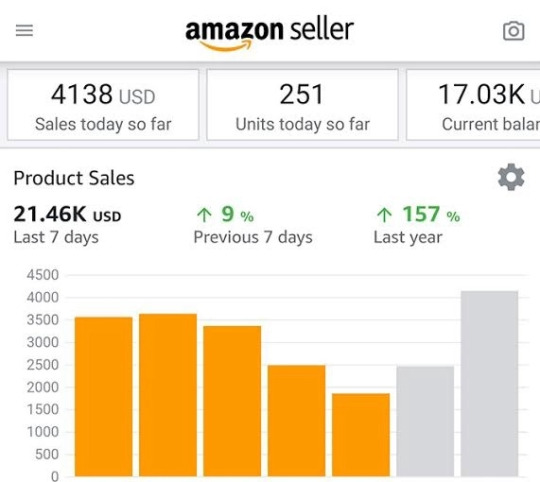
Conclusion: Starting a successful Amazon FBA business requires careful planning, research, and execution. By following the steps outlined in this guide, you can start your Amazon FBA business and build a profitable online business in 2023. Remember to stay focused, monitor your performance, and always be on the lookout for new opportunities to scale your business.
Just remember you are one product away! Focus on only improving and differentiating your product…
4 notes
·
View notes
Text
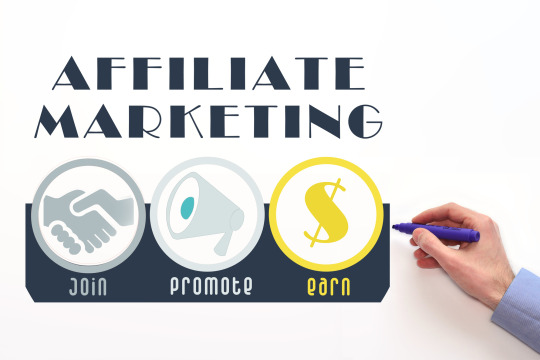
Affiliate Marketing For Beginners: What It Is + How to Succeed
What is affiliate marketing?
Affiliate marketing is where you promote another company’s product or service. When someone purchases through your affiliate link, you earn a commission. These commissions are usually a percentage of the sale price or a fixed amount.
Why should you do affiliate marketing?
Here are two reasons why you should consider doing affiliate marketing:
1. Low-cost and low risk
Starting a business can be risky and expensive because there are upfront costs for products, employees, equipment, rent, etc. With affiliate marketing, all you need is a website. If it doesn’t work out, you’ve only wasted time and a little bit of money.
2. Easy to scale
A typical salesperson only sells products from one company. As an affiliate marketer, you can promote products from many different companies and earn commissions from all of them.
How does affiliate marketing work?

Drive traffic to your affiliate site;
You’ve created great content. The next step is to get more people to read it, so they will click on your affiliate links.
Here are three traffic strategies to consider:
A. Paid traffic
This is where you pay for traffic to your site. You can do this using pay-per-click (PPC) ads.
The advantage of paid traffic is that the moment you start paying, you get traffic.
However, there are some downsides.
First, running ads will dig into your profits. It’s quite normal for advertisers to lose money before they make it… if they ever do.
Secondly, once you stop paying for ads, your traffic will stop.
Generally speaking, ads are a great traffic strategy if you’re part of a high-paying affiliate program and can make the numbers work.
But if you’re completely new to paid marketing and have no marketing budget (or are working with lower commission programs like Amazon Associates), then it might not be such a great idea.
B. SEO
SEO is the practice of optimizing pages to rank high in search engines like Google.
For as long as you can rank high in the search engines for your target keywords, you’ll get consistent and passive traffic.
On the most basic level, SEO is about:
Understanding what your target customers are searching for
Creating content around those topics
Making sure Google understands clearly what your page is about
Acquiring or earning links to push your pages higher in the search engines
Ensuring Google can find, crawl, and index your content
C. Build an email list
Email lists allow you to communicate with your readers anytime.
Use them to tell fans about new content and keep them coming back to your site for more. This leads to more affiliate clicks and sales.
To build an email list, you need to persuade the readers on your site to sign up. That means offering something valuable, like a free eBook, an email course, and more.
Affiliate marketing tools::--
Tools are your friends in affiliate marketing. They help you do your job faster and easier.
Here are some of our recommended affiliate marketing tools:
Ahrefs — All-in-one SEO tool that’ll help you research keywords to target, audit your website, research your competitors, find content ideas, and more.
Rank Math — WordPress plugin that ensures your pages have optimal on-page SEO.
Google Search Console — Find and fix technical errors on your website, submit sitemaps, see structured data issues, check your Core Web Vitals, and more.
Google Analytics — Provides crucial data and analytics for your affiliate website.
Thirsty Affiliates — Keep track of your affiliate links, see statistics to know which links are getting the most clicks, and prevent others from easily copying your website and swapping the links with their own affiliate IDs.
-----------$$$$$$$$-------------
#affilate marketing#online buisness#built structure#business#own it#refer and earn#earn online#free earning#low rise#strategy#carrier
4 notes
·
View notes
Text
thanks for the tag!!! and i apologize for the length of my response, lol. i went through a lot of phases. a few of them stick out more than the rest though! throughout the course of my life, in no particular order: - veterinarian: my oldest career choice, before i knew how psychologically intense this career is. plus all of the technical knowledge and years of post-education. ultimately not for me in the slightest. (to be fair, all i knew as a kid was that i wanted my job to somehow relate to animals.) - farmer: sort-of achieved, on a backyard scale! i've been able to produce and sell animal products and intend to expand the scale of my backyard venture soon. :) - forensic scientist: i know more now than i probably should about how to get away with various crimes thanks to this interest and having taken some classes, lol. i went through a brief phase where i wanted to solve cold cases. now it's probably just useful if i ever wanted to write an accurate murder novel or something. - cyber security/IT: i know a few programming languages thanks to this interest. i even took on an intership at amazon for awhile...before i learned how insidious the industry is. as a disabled person, this career would have eaten me alive. - game developer: i made a few games! but they never saw the light of day lol. and they never will. - meteorologist: when i was in middle school i would document the daily local forecast on my paper journal, every single day. i wanted to chart changes in the weather over a long period of time. my school teacher crushed this goal though--told me there were other people already doing it and that i was wasting my time. :/ i think a lot about what i might have found if i had kept going, considering the recent intensifying symptoms of climate change. - storm chaser: similar to the above, i was just obsessed with weather patterns and the like. i still am, though having been through several minor weather scares now i have decided i definitely lack the courage to do anything with this career lol. the shows are cool though! - artist: i did achieve this to some degree, at least as a hobby. i've been drawing for the past 16 years. but i draw more for myself than for any sort of monetization or profit. - author: i've written fic over the years, but haven't published any original works. so it depends on how you look at it i guess. - field journalist: this is probably my biggest goal i ever had in my life, overall. all my life i have wanted to go out and explore the remaining wild areas of the earth, where humans can observe completely natural and wild behaviors from animals. i also want to hand-document the effects of climate change and engineer new solutions of dealing with it. and i want to shake the hand of sir david attenborough, my lifelong biggest hero. but given my disabilities, it's unlikely i'll ever be able to do any of this; so i content myself with taking photos, observing, and documenting the things i observe in my local environment for my own enjoyment.
currently i've succeeded in one thing i never originally thought i would do: content creation. while i'm no markiplier by any stretch of the imagination, i have made money from my work, so i do loosely count as a professional content creator. i think it would be cool to find some sort of way to intersect this with the aforementioned field journalism. maybe if i built up some sort of portfolio, i could work something out with national geographic...that would be a dream come true. tagging: @grimparadise @the-redrook @the-voidkin-playground @errorciphersystem @malign-intervention
if we lived in a world where u had to do the career u were first interested in as a child what would u be doing, id be a firefighter
120K notes
·
View notes
Text
StorePal AI Review – Build a Profitable Online Ecom Store in Minutes
Welcome to my StorePal AI Review. If you’re venturing into the eCommerce world, you could easily find yourself believing launching and nurturing a successful eCommerce store is a challenging task. There are complexities from product selection to website design, to marketing strategies and ongoing customer engagement on the road to success.

Yet, given the rapid development of Artificial Intelligence (AI) tools, entrepreneurs today, have it much easier than ever to automate the process of creating, managing, and scaling profitable eCommerce stores. StorePal AI is one such game changing AI tool which promises to shake things up on how users start their online businesses.
Building a Commerce Store isn’t for everybody whether you want to sell physical products, digital products, or products created by your affiliate partners but with StorePal AI you can have your fully functional store all in 60 seconds. In this detailed article, we will have a deep look at StorePal AI, its key features, benefits, how it works, pricing, pros, cons, and how it performs.
What Is StorePal AI?
StorePal AI is a powerful cloud enable AI eCommerce app for those who are new to eCommerce or want to quickly open an online store with no coding skills necessary. StorePal AI simplifies the store creation process no matter if you are a complete beginner or a seasoned business owner, offering all the tools to get you generating revenue from your physical, digital, and affiliate products.

One of the main reasons why StorePal AI offers such a sell in the world of eCommerce creation is that it can provide you with a fully functional eCommerce store with 60 seconds flat. It takes care of store design, product selection, marketing setup much better than we ever could, and it even gives you the ability sell a variety of product types that would have taken days, or even weeks, to set up manually.
StorePal AI Review: Overview of Product
Product Creator: Ganesh Saha
Product Name: StorePal AI
Launch Date: 2025-Jan-23
Launch Time: 11:00 EST
Front-End Price: $17 (One-time payment)
Official Site: Click Here To Visit Official Salespage
Product Type: Tools and Software
Support: Effective Response
Discount: Get The Best Discount Right Here!
Recommended: Highly Recommended
Bonuses: YES, Huge Bonuses
Skill Level Required: All Levels
Discount Coupon: Use Code “STOREPALVIP” To Get $5 Off (Full Funnel)
Refund: YES, 30 Days Money-Back Guarantee
StorePal AI Review: About Authors

Ganesh Saha is the brains behind this invention. With his know-how in technology and starting businesses, Ganesh gathered a team of experts to make StorePal AI, the top AI Software for making great StorePal AI and sketch characters. With Ganesh leading the way, StorePal AI lets anyone build Ecom store website their own stuff in no time.
Also, you can see some of his other creations like VisualPal AI, CalendarPal AI, AI PixelSite, GraphicX Ai, VisualHub AI, OverLap AI, AI Doodles, AI CartoonBook, CookMate AI, Mailmaxpro, Plexity Ai, WebinarStudio, Ai Force, MailBard Al, Ai Designs, AISites, PrimeAi, VRStudio 2.0, Text Ai, OnyxMail, PrimeBook, PrimeMovie, SiteDetective, and many others.
StorePal AI Review: Key Features of StorePal AI
First To Universe Technology Creates Your First Profit Pulling Amazon Like eCom Stores In Under 60 Seconds
Robust AI Tech Smartly Creates Fully Functional eCom Stores In HOTTEST Niches In Minutes
Sell Thousands Of Profitable Digital Products, Physical Products and In-built Amazon Products In 3 Clicks
Monetize Instantly Using Premium Stripe, PayPal & Other Leading Payment Gateways
Advanced, Easy To Use Drag & Drop Store Builder Bids Goodbye To Complex Tools Forever
Add blogs to your store to boost content marketing and SEO
Manage Product Variant Like sizes, colors, and images.
Tap Into The HUGE $6.33 Trillion eCom Industry With Zero Grunt Work At Your End
Launch Premium, Self-Updating eCom Stores That Rank High On Google With No Third Party Dependency
AI Creates User-Friendly, Mobile-Responsive, And Visually Appealing Stores On The Go
Write SEO Friendly Product Descriptions Like A Breeze
Inventory Management to Track stock levels In real-time.
Use categories, tags, and collections for easy navigation.
Send Inbox Friendly Emails To Your All Customers
Stop Searching For Reliable Freelance Designers or Store Creation Tools Today
Battle Tested AI Technology Sends 100% buy Ready Traffic to Your eCom Stores without Even Lifting Your Finger
Create FOMO Using Exclusive Discount Coupons & Promotional Campaigns
Sell in multiple currencies with automatic exchange rates.
Set up custom shipping rates for different countries/regions.
Modify Meta tags, alt text, and product descriptions for SEO.
Create custom discounts and promo codes.
Track performance of individual products and collections.
Detailed insights into customer behavior, with order history.
Track Your Sales, Orders & Online Store Traffic In Real Time
In-built Free SSL certificate to Secure Your Store.
Say Goodbye To Expensive Ecom Builders Like Shopify & More
Iron Clad 30 Days Money Back Guarantee Included

StorePal AI Review: How Does It Work?
You’re Just 3 EASY Steps Away To Launch Your First 100% Profit Pulling Amazon Style eCom Store
Step #1: Login
To get started, just login into this masterpiece & be on the fast track to success using artificial intelligence to create your first Amazon style eCom store loaded with red hot products that your audience simple love.
Step #1: Create
Now, insert the keyword for which you’re looking to create your eCom store, & watch our proprietary AI tech create 100% profitable eCom stores in a few clicks of your mouse. Remember, no wasting hours manually creating stores, no creating descriptions for your products, no worrying for integrating payment gateways, no monthly subscriptions & no third party dependency.
Step #1: Publish & Profit
Boom, you’re done. Now publish these amazing eCom stores loaded with red hot products & see hordes of customers getting hooked like never before. And that’s all needed to profit from StorePal AI (Just follow these easy steps & witness a tornado of leads, sales & profits like never before)
StorePal AI Review: Benefits of StorePal AI
AI Creates Your First Profitable Amazon Style eCom Store In Under 60 Seconds
Monetize Instantly Using Premium PayPal & Stripe Integration
Sell Limitless Red Hot Products Globally To Hungry Audience & Boost Commissions
Profit Instantly Selling Thousands Of Profitable Digital Products, Physical Products and In-built Amazon Products
Drive Tons Of Traffic Using In Built Traffic Syndication System
Never Pay For Expensive Third Party Platforms
Never Worry For Low Engagement & Conversions
Drive Tons Of Leads, Conversions & Traffic To Your Offers
No Huge Investment- Its Pocket Friendly
No Need To Learn Complex Coding Or Designing Skills
In-built Free SSL certificate to Secure Your Store
Say Goodbye To Expensive Ecom Builder Like Shopify & More
24*7 Premium Support To Solve All Your Issues On-Time
Commercial Licence Included
StorePal AI Is All-In-One Platform So You Just Sit Back & Relax
StorePal AI Review: Demo Video
Just Watch StorePal AI Down Below To Get All The Details:
StorePal AI Review: Who Should Use It?
eCom Store Creator
Website Owners
Social Media Marketers
Affiliate Marketers
E-com Store Owners
Video Marketers
Small Business Owners
Bloggers & Vloggers
Coaches/Trainers
Advertising Agency Owners
Video Ad Creators
Webinars/Seminars
Presenters
Product Review Marketers
Ditigal Trend Setters
Brand Influencers
StorePal AI Review: OTO’s And Pricing
Add My Bundle Coupon Code “STOREPAL30″ – For 30% Off Any Funnel OTO Below
Front End Price: StorePal AI ($17)
OTO1: StorePal AI Premium Edition ()
OTO2: StorePal AI Unlimited Edition ()
OTO3: StorePal AI Ebook Edition ($37)
OTO4: StorePal AI DFY Edition ($147)
OTO5: StorePal AI Max Edition ($67)
OTO6: StorePal AI Store Edition ($37)
OTO7: StorePal AI AudioBook Edition ($47)
OTO8: StorePal AI Agency Edition ($97/$197)
OTO9: StorePal AI Reseller Edition ($97/$197)
OTO10: StorePal AI WhiteLabel Edition ($397)
StorePal AI Review: Money Back Guarantee
Try Our StorePal AI Today With 30 Day Money Back Guarantee!
We are very sure you will fall in love with these awesome powers you get with StorePal AI today. That is why we are giving each of our valued customers a no questions asked money back guarantee. Try it for next 30 days, if you feel that it has not produced the results you expected, simply send me the bottle back and your money back with no argument, FULL STOP.
StorePal AI Review: Pros and Cons
Pros:
Quick and easy store setup.
No technical or design skills required.
All-in-one solution for eCommerce needs.
Cost-effective compared to traditional platforms.
AI-driven features improve efficiency and profitability.
Cons:
Requires a one-time Fee.
Requires stable internet connection.
Nothing wrong with it, it works perfectly!
My Own Customized Exclusive VIP Bonus Bundle
***How To Claim These Bonuses***
Step #1:
Complete your purchase of the StorePal AI: My Special Unique Bonus Bundle will be visible on your access page as an Affiliate Bonus Button on WarriorPlus immediately after purchase. And before ending my honest StorePal AI Review, I told you that I would give you my very own unique PFTSES formula for Free.
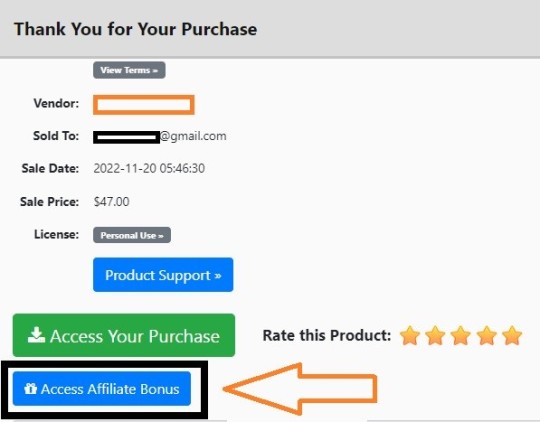
Step #2:
Send the proof of purchase to my e-mail “[email protected]” (Then I’ll manually Deliver it for you in 24 HOURS).
StorePal AI Free Premium Bonuses

Frequently Asked Questions (FAQ’s)
Q. Is it easy to get started with StorePal AI?
Yes, all you got to do is just follow 3 simple steps that we’ve mentioned above, and get ready to kick out monthly sucking third party artificial intelligence platforms forever.
Q. Do I need experience or tech/design skills to get started?
StorePal AI was created keeping newbie’s in mind. So, it’s 100% newbie-friendly & requires no prior design or tech skills.
Q. Do you provide a money back guarantee?
Absolutely yes. We’ve already mentioned on the page that you’re getting a 30-day money back guarantee. Be rest assured, your investment is in safe hands.
Q. Is step-by-step training included?
YEAH- StorePal AI comes with step-by-step video training that makes it simple, easy & guides you through the entire process with no turbulence.
Q. How are you different from available tools in the market?
This tool is packed with industry-leading features that have never been offered before. Also, if you’re on this page with us, which simply means you have checked out a majority of the available tools and looking for a complete solution. You’ll not get these features ever at such a low price, so be rest assured with your purchase.
Q. Does your software work easily on Mac and Windows?
Definitely, StorePal AI is 100% cloud based. You can use it on any Mac or Windows operating machine.
Q. Do you provide any support?
Yes, we’re always on our toes to deliver you an unmatched experience. Drop us an email if you ever have any query, and we’ll be more than happy to help.
My Recommendation
StorePal AI is a powerful and innovative tool that simplifies e-commerce by turning e-commerce into a game for everyone, no matter what technical skills they have or know. StorePal AI is a powerful AI tool with unique features, cost effective pricing and user friendly interface that helps entrepreneurs create, manage and scale profitable online stores.
If you are looking for an easy and quick way to kick start or amplify a business of this type, StorePal AI is definitely worth checking out. Don’t pass up this opportunity to revolutionise your eCommerce world!
>>> Click Here To Get Instant Access StorePal AI Now <<<
Check Out My Previous Reviews: Infinity Box AI Review, SPARK Review, PromptBuddy Review, KdpBooksAI Review, and Omega AI Review.
Thank for reading my “StorePal AI Review” till the end. Hope it will help you to make purchase decision perfectly
#storepalai#storepalaireview#storepalaicoupon#storepalaihonestreview#storepalaifeatures#storepalaiworks#whatisstorepalai#storepalaireviews#buystorepalai#storepalaiprice#storepalaidiscount#storepalaife#storepalaioto#getstorepalai#storepalaibenefits#storepalaibonus#howtostorepalaiworks#storepalaisoftware#storepalaiFunnels#marketingprofitmedia#storepalaiUpsell#storepalaiinfo#purchasestorepalai#software#traffic#storepalaiexample#storepalaiworthgorbuying#ai#aiapp#aitool
1 note
·
View note